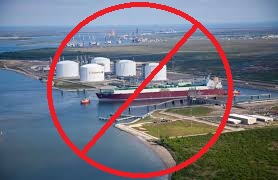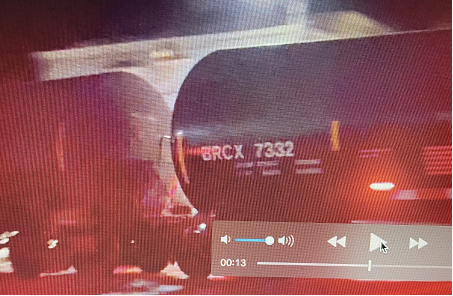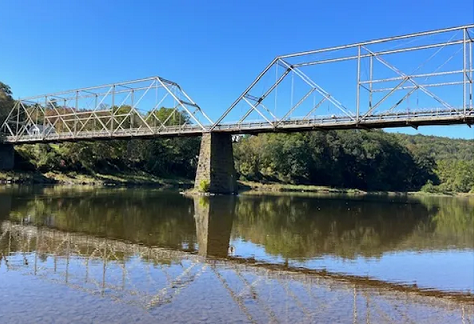
Biden Hits Pause on Natural Gas Projects Amid Plans for Carbon ‘Mega Bombs’
January 27, 2024
I Tell PA Senators: Support Renewable Energy Jobs, Not LNG Exports
March 1, 2024‘Bomb Trains’
Poly Vinyl Chloride
Ethane Cracker Plants
Ted Waddell’s Train Bomb Coverage in the River Reporter
Petition to Ban LNG on Trains in the DRB
Please register now for EPA Webinar on Banning Vinyl Chloride 2.20.24, at 1:00 – 4:00
Please sign the Catskill Mountainkeeper petition telling President Biden and United States Department of Transportation Secretary Pete Buttigieg to keep “bomb trains” carrying highly explosive liquefied natural gas (LNG) out of our communities.
Download this Blog post as a pdf.
Jess Conrad, of Beyond Plastics, discusses the East Palestine, Ohio train derailment:
Victoria Lessor lives near the train tracks in Callicoon NY. She’s very concerned about the black and white tanker cars, of which she has counted up to 45 at one time, that are marked hazardous. The train company offers no info on what’s in these marked cars. She points out that we have protected the Delaware River from the fracking,..but, she states correctly, “The speeding trains along the Delaware could do as much damage (as fracking) if there was an accident”.
So Victoria invited a rep from Senator Schumer’s office, as well as Assemblywomen Aileen Gunther, to see the proximity of the tracks to the river in front of her home, and to alert them of her concern. They both said there is a federal bill that’s pending about rail safety. In the meantime, Victoria wants to know what they are carrying at such speeds, and what the risk is to the river corridor. Maybe certain trains with hazardous materials need to be rerouted to a less vulnerable area, away from this pristine water source, a valuable source of drinking water.
Rebekah Creskoff, a resident of the Delaware River Basin, and a volunteer for Beyond Plastics, is also concerned, and has been sharing information on the Upper Delaware Network about these train cars and what they are carrying. One main concern is the possibility that Vinyl Chloride is being transported along the Delaware River. Vinyl Chloride is a highly flammable liquefied gas, pressurized for shipment under its own vapor pressure via rail or truck.
Is it safe to transport Vinyl Chloride on trains?
Recently a train derailed in East Palestine, Ohio on Feb. 3, 2023. It was carrying 115,581 gallons of Vinyl Chloride. Jess Conard resides in East Palestine. I recorded her story regarding the East Palestine derailment during a Beyond Plastics class. Her life was forever changed because of this train derailment. She has since left her job, and now works with Beyond Plastics.
So here’s a problem with Vinyl Chloride, Poly Vinyl Chloride (PVC), and related plastics
As early as 1974, scientists have warned the public that Vinyl Chloride, which is used to make polyvinyl chloride plastic (PVC or Vinyl), is a known human carcinogen. As a gas, it emits a colorless sweet smell that causes liver, brain and lung cancers as well as leukemia and lymphoma. That’s one reason it’s labeled hazardous on the train cars that carry it, because if it spills or blows up it will contaminate any land, water, or air it comes in contact with, as well as the inhabitants that reside there. In addition, when the PVC pipe and all the other various plastics that are made from it decomposes in landfills, or is exposed to fire or incineration, it releases toxins into the soil, the air, and exposed water sources. Plasticizers are added to PVC to make it supple for use in Vinyl products like shower curtains, clothing bags, flexible plastic tubing, electric wire insulation and coatings, play mats, inflatable toys, camp beds, paddling pools, and vinyl toys. These soft PVC items often contain toxic additives called phthalates, like (DEHP) Di(2-ethylhexyl) phthalate. Phthalates are suspected carcinogens and reproductive toxicants. Other toxic chemicals like PFAS are getting into the Vinyl Chloride through the fracking process.
Beyond Plastics: The Perils of PVC Plastic Pipes
Beyond Plastics is at the forefront tackling the plastic pollution problems. Here’s a link to a recent study on why Beyond Plastics believes this harmful chemical must be banned.
Endocrinologist Pete Myers on Plastic and Fetal Development
In case you’re not convinced, here’s the link to a presentation by Pete Myers, an expert on endocrine disruptors on how plastics threaten fetal development. Pete Myers wrote a book along with Dr.Theo Colborn, PhD, and Dianne Dumanoski in 1996 called Our Stolen Future which introduced the world to endocrine disruptors. Pete Myers states,” I can’t tell you how many physicians I’ve spoken to who said, “you changed my career with that book.” Dr. Colborn worked tirelessly with DCS to ban fracking in the Delaware River Basin. She was featured in the movie Gasland.
**************************************************************************************
So is it safe to transport hazardous chemicals like Vinyl Chloride on the trains that travel the Upper Delaware River?
Here’s the extensive coverage of this train rail issue by Ted Waddell at the River Reporter
2/21/2023 Concerns about railroad derailments
This article is the first in a series that will explore safety protocols, historic derailments, and the coordination and communication between the national, state and county emergency management agencies that help ensure railroad safety and respond to emergencies.
3/7/23 Guardians of the Delaware River – National Park Service
Excerpt-Beginning at the confluence of the East and West Branches of the Delaware at Hancock, NY, the UPDE extends 73.4 miles downstream to Railroad Bridge No. 2 near Mill Rift, PA, and is mandated, along with numerous cooperating partners, to protect and manage the river and 55,575 acres of land associated within the designated boundaries. The management partnership includes 15 municipalities, NYS, PA, the Delaware River Basin Commission DRBC, the Upper Delaware Council (UDC) and the NPS…..The National Response System, a unit of the United States Environmental Protection Agency (EPA) is a “multi-layered system involving individuals and teams from tribal, local, state, and federal agencies, as well as industry and other organizations.” At the heart of the system is the National Oil and Hazardous Substances Pollution Contingency Plan….
3/7/2023 Putting derailments in perspective
Excerpt- For the record, there are about 3,500 miles of track in New York State, down from a reported 8,400 miles during the halcyon days of the 1920s. Pennsylvania ranks near the top with 5,600 miles of rail….and ….As a result of the highly publicized derailment in East Palestine, OH, emergency response personnel and residents were reportedly exposed to a toxic brew of chemicals such as vinyl chloride, ethylene glycol monobutyl ether, isobutylene, and butyl acrylates, resulting in numerous complaints of health-related concerns and environmental contamination.
3/1/23 Concerns about railroad derailments
Excerpt- A trip through history The first recorded derailment in the Upper Delaware River corridor occurred on July 15, 1864 and was tabbed by the Civil War-era press as “The Great Shohola Train Wreck,” a deadly disaster that claimed the lives of many butternut-clad Confederate prisoners of war, and several of their “Yankee” guards in blue. Here are the others. —February 13, 1907—September 1, 1915—January 31, 1965— Late December, 1974—August 19, 1999—-October 12, 2005—August 9, 2018
3/22/23 The firestorm for railroad safety reforms intensifies
Excerpt-“On March 8, the Association of American Railroads (AAR), which bills itself as the “world’s leading railroad policy, research and technology organization focusing on safety and productivity of rail carriers,” weighed in on the recent derailments with several suggestions for the industry, geared toward restoring trust in the nation’s rail carriers.
(Here’s one suggestion I thought would be helpful for residents who live near tracks and for first responders, but please read them all).
“…..expanding access to the AskRail app, which “provides real-time information about the contents of every car in a train and the safe handling of those contents [in the event of an accident] into the hands of every first responder”. Wouldn’t you want that if you were a firefighter or a homeowner near the river?
3/28/2023 Turning up the heat on the rail industry
Excerpt-“According to an article published by ProPublica, Norfolk Southern Railroad policy allows officials to order train crews to ignore safety alerts from “train track sensors designed to flag potential mechanical problems” such as overheated wheel bearings, which were reportedly the cause of the February 3 derailment in Ohio, in which 38 rail cars derailed, 20 of which contained hazardous materials in the consist, and 11 of which were derailed.”
(Rebekah Creskoff, from Beyond Plastics, shared these articles on the UD Network. The 2 links to the history of train derailments are highlighted. As you can see, another derailment is a very real threat.
**************************************************************************************
Vinyl Chloride Comes From
ETHANE CRACKER PLANTS
At Ethane Cracker plants ethane is extracted from the natural gas stream (it is one of the natural gas ‘liquids’), and is processed into plastics like polyethylene and Vinyl Chloride. Living near an Ethane Cracker plant exposes one to toxins that put health at risk. According to the American Chemistry Council, industry has plans to significantly increase the number of cracker plants around the US. Most people don’t know about the insidious connection between plastics, cracker plants, and the fracking industry, but they find out very quickly once they hear when one is being proposed. They’re attending hearings, writing editorials, alerting elected officials and sharing details about what it is like for communities living near these ethane plants.
“Plastic production is increasing NOT because consumers want more plastic,” said Judith Enck, the president of Beyond Plastics, an advocacy group working to end plastic pollution. “It’s because there’s a glut of fracked gas.” Frack gas is cheap and abundant now. At the same time, Americans are turning to sustainable alternatives. Too bad these companies can’t embrace what Americans want, and what’s good for all future residents of this planet. This article in Inside Climate News explains how fracking fuels plastics manufacturing. The local Climate Reality chapter has even designed a cracker plant toolkit to guide your education and activism.
A Final Comment about the Train Bombs
There’s a vast plastic-making infrastructure in the US that traverses thousands of miles of US railways. Do we really need all this additional plastic in our lives, in our oceans, in our air, in our water, in our soil, in our bodies, and on our railways? Plastics are being incinerated and landfilled, not recycled. Only 6% of all plastic is being recycled. For every 3 tons of plastic incinerated, one ton becomes toxic waste, full of pollutants like micro plastics, bisphenols, phthalates, and PFAS.
***************************************************************
Where Does the EPA Come In And How You Can Help?
The EPA often holds daytime webinars
They need to hear the concerns of the public
In December 2023, the U.S. Environmental Protection Agency (EPA) announced that it was beginning the process to prioritize five chemicals for risk evaluation under the Toxic Substances Control Act (TSCA). One of those chemicals is (you guessed it) vinyl chloride, which Beyond Plastics wants to see BANNED and so does DCS.
You can register now for this important webinar on February 20, 2024, at 1:00 – 4:00 p.m. EST.
There will be a comment period towards the end of the webinar about the banning of vinyl chloride. You will not be able to speak unless you signed up previously.
Beyond Plastics is asking that you wear red to remind the EPA where you stand.
If you did sign up to speak, and you have any questions you can email Sarah Soliman.
If you would like to send written comments
EPA will accept written public comments on these chemicals for 90 days after publication at the Regulations pageExit EPA’s website under docket EPA-HQ-OPPT-2023-0601
https://www.regulations.gov/faq?anchor=downloadingdata
************************************************************
3/14/23 Keeping Watch- Catskill Mountainkeeper:
Excerpt- Gillingham referred to the 2018 derailment near Deposit, NY, an incident that spilled an estimated 4,000 gallons of diesel fuel into the West Branch of the Delaware River. It occurred, he said, “during a rainstorm, an extreme weather event… at a stream crossing that had washed out. “Basically the train tracks were [up] in the air, and couldn’t hold the train when it went to cross,” he said.
Petition From Catskill Mountainkeeper
“Bomb Trains, art, and more” by Wes Gillingham 2/22/23 River Reporter
Sign the [Catskill Mountainkeeper] petition telling President Biden and United States Department of Transportation Secretary Pete Buttigieg to keep “bomb trains” carrying highly explosive liquefied natural gas (LNG) out of our communities.
The Petition
*The petition can be found at www.catskillmountainkeeper.org/stop_lng_by_rail. There are 248 signatures to date. There needs to be many more. Please share this.
**********************************************************************************
The River Reporter
Community Journalism
As you can see the River Reporter has written many articles on the topic of TRAIN BOMBS. Help keep community journalism strong by subscribing. The RR played a huge roll in keeping everyone informed about the Fracking issue and continues to keep us informed. There’s nothing like the paper copy, but the digital version is easy to maneuver. The SUSTAINABILITY articles alone are worth the cost of the subscription. There are many about plastics and the reason why these toxic chemicals are being produced and transported to begin with. Under Community Living, click on Sustainability. Here are two to get you started.
https://riverreporter.com/stories/building-healthy-houses,121052?
https://riverreporter.com/stories/dress-sustainably,131869?
***************************************************************
How to Contact the Railroad
(Provided by Laurie Ramie, Executive Director of the www.upperdelawarecouncil.org)
Here is information on how to contact the railroad’s parent company, New York Susquehanna & Western Railway. The operator of the Southern Tier Line tracks is Central New York Railroad based in Cooperstown. Their phone number is (607) 547-2555, including for their Safety and Compliance staff.
**********************************************************
OTHER NEWS SOURCES COVERING THIS
The Washington Post, Bloomberg News, ProPublica, NPR, NYTimes
The Surprisingly Lax Regulations of Our Railroads NPR FreshAir interview Award-winning ProPublica reporter Topher Sanders has spent the last two years investigating America’s aging freight train system. He says the Federal Railroad Administration monitors “less than 1% of what’s happening on the rails.” Sanders talks about the toxic East Palestine, OH derailment, the prevalence of blocked railroad crossings, and why railway safety legislation is yet to be passed. (This link does nor work on Safari)
The toxic legacy of an Ohio train derailment is still unclear Bloomberg News
One year after a Norfolk Southern train derailed in East Palestine, Ohio, residents have little information about long-term health impacts.
Millions of Americans Face Risk of ‘Toxic Bomb Train’ The Washington Post
Throughout any day, more than 200 rail cars filled with the chemical are moved across nearly 2,000 miles of U.S. railways…
This Deadly Chemical Should Be Banned The New York Times
(Please consider sharing this with other concerned individuals)
America is replacing its pipes: Is ductile iron pipe a good alternative for plastic?
One year after the toxic train derailment, is East Palestine safe? Depends on whom you ask.




